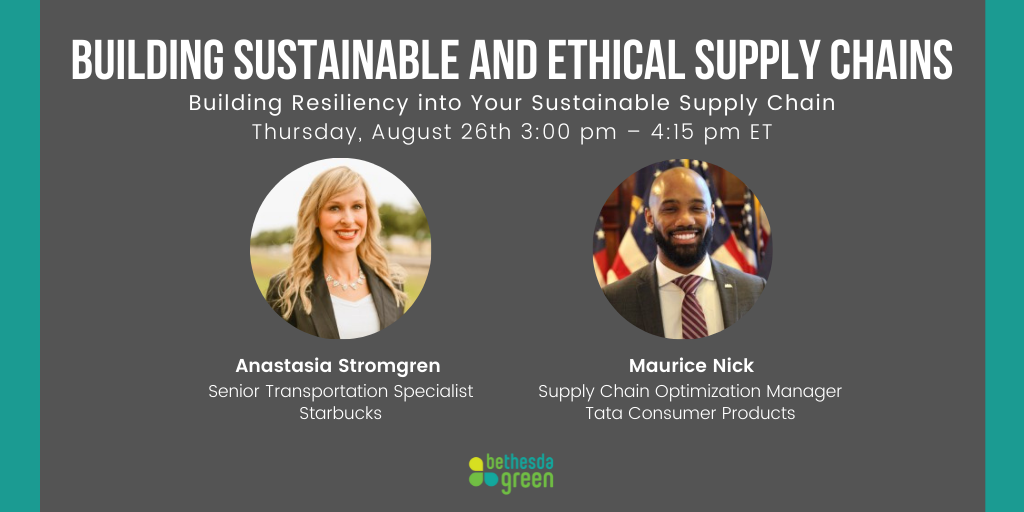2021 Summer Speaker Series: Tackling Environmental Challenges Through Sustainable Entrepreneurship
Building off the success of last year’s summer speaker series, Bethesda Green’s Innovation Lab is once again bringing together founders, industry experts, and policy makers for a series of conversations that will inspire and educate all who attend.
During our 2021 Summer Speaker Series, 14 industry experts are coming together to discuss two primary topics: 1) Building Sustainable and Ethical Supply Chains and 2) Measuring Impact and Managing Risk.
The following is a summary of the final session hosted on Thursday, August 26th.
Session #5: Building Resiliency into Your Sustainable Supply Chain
Panelists:
- Anastasia Stromgren – Senior Transportation Specialist, Starbucks
- Maurice Nick – Supply Chain Optimization Manager, Tata Consumer Goods
Watch the full session on YouTube here:
https://youtu.be/h6xmLBjw3H0

For this conversation, we brought together industry experts to discuss how global supply chains are increasingly vulnerable to disruptions stemming from climate change, natural disasters, and other global crises. We welcomed Anastasia Stromgren, who is a senior transportation specialist for the global supply chain at Starbucks, and Maurice Nick, who is a supply chain optimizer for Tata Consumer Products to share suggestions for how entrepreneurs can protect their businesses and ensure long-term business continuity by strengthening the resilience of their sustainable supply chains. Below, please find a collection of some of the key tips and tricks for founders to consider.
Tips for Building Sustainability into Supply Chains
Build sustainability into your company’s core values. Sustainability encompasses both environmental and social factors. Industry leaders have the power to enforce changes to supplier practices related to the environment, working conditions, and worker benefits, which can include everything from water usage and installing air conditioning in factories in hot climates, to making sure children who live on site at manufacturing plants receive an education. While companies may have to stray from certain goals during challenging times, our panelists agreed that founders should always rely on their company’s core values to influence strategy.
Break down your sustainability strategy into smaller targets – Develop a strategy that enables your company to reach realistic milestones. For example, if a company wanted to make their packaging more sustainable, different targets might include:
- Identify all the problems with current packaging by the end of the year
- Update designs to ensure all packaging is reusable, recyclable, or compostable by 2025
- Eliminate all plastic packaging by 2030
- Update designs to make sure packaging comprises less than 30 percent of a product by 2035
Audit your suppliers – Companies should regularly audit their suppliers to make sure they are meeting sustainability targets, and such audits should include site visits. Starbucks makes their sample audit public on their website. Although some companies find it beneficial to use an external certification, Starbucks prefers to use a customized model that meets their specific needs.
Be flexible and transparent – Companies should be prepared to evolve sustainability targets to meet current supply chain demands and should be transparent about how such changes may impact stakeholders. For instance, when Starbucks replaced reusable cleaning clothes with disposable cleaning wipes at the start of the coronavirus pandemic, they had to think about how they were going to make up for what they were now sacrificing in sustainability (and also spending in dollars) in order to balance their sustainability goals. When they temporarily stopped honoring their reusable cup policy in which customers could receive discounts by bringing their own mugs, Starbucks had to communicate these changes with customers and adjust available inventory of disposable cups.
Tips for Making Supply Chains More Resilient
As a result of the coronavirus pandemic, companies are facing tremendous supply chain challenges, including labor shortages, limited access to raw materials, and transportation backlogs, to name a few. Below are some tips companies can follow to strengthen their ability to respond quickly and effectively to these types of challenges.
Know your suppliers – Conducting site visits to develop strong personal relationships is a useful technique to build rapport with suppliers before a crisis occurs. After all, suppliers will likely provide more honest and accurate information when they are not operating in crisis mode, and such data will enable a company to have a better idea about supplier production capacity, surge capability, and other limitations before an emergency arises. The more information a company has available, the easier it will be to make data-driven decisions about which product lines to cut or which supplier to push harder if the need arises.
Understand the environment. Companies should have a good understanding of the region where their suppliers are located and have plans in place to respond to crises that may be happening in those regions. In some cases that could mean shifting from a just-in-time model to holding certain parts required for a product in inventory, or it could mean diversifying or even reshoring suppliers.
Understand the marketplace – A company’s position in the marketplace can affect supplier relations and supply chain strategy. For instance, is it better for a company to spread their business across many suppliers to reduce disruption or prioritize work with a few key suppliers? A supplier may service many customers, and a company should understand whether their business is highly valued. Smaller companies, who may have limited resources to manage relationships with a lot of suppliers, may benefit from developing a more personal relationship with key suppliers who may then be inclined to prioritize them should a crisis occur.
Know your priority customers – During crises, not all customers can be serviced equally, and emotions can impact decisions. A data-driven approach to selecting your priority customers can make it easier to respond quickly should a supply chain disruption occur.
Identify third-party logistics providers for busier times – During busier periods it often makes sense for companies to use third-party logistics providers to meet temporary increased capacity needs, and it can be a good idea to have a list of providers at the ready. Companies should understand a provider’s capacity and what products each provider can produce, especially since particular products may require manufacturers to have special certifications.
Avoid overcompensating for a crisis Companies should practice data-driven decision making efforts that are based on facts and checks and balances, and should avoid knee jerk, emotional responses to crises. For example, some companies that procured tons of hand sanitizer early on during the early days of the coronavirus pandemic are left sitting on years worth of inventory.
See recordings and read summaries or other sessions from Bethesda Green’s Summer 2021 Speaker Series: Tackling Environmental Challenges Through Sustainable Entrepreneurship here:
Learn more about our upcoming panels and register here.
About the Authors:
Jordan Lee is a Program Assistant at Bethesda Green.





